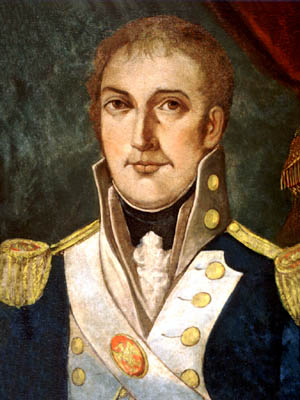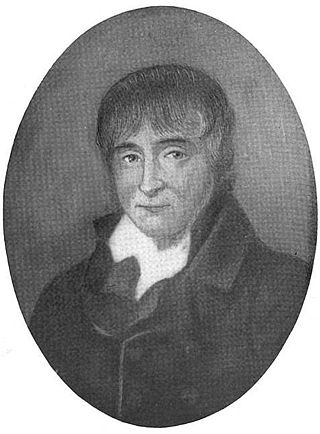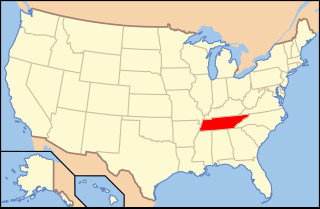William Grainger Blount was an American politician who represented Tennessee's 2nd district in the United States House of Representatives from 1815 to 1819. He is the son of Southwest Territory governor William Blount and nephew of Tennessee governor Willie Blount, serving under the latter as Tennessee Secretary of State from 1811 to 1815.

William Charles Cole Claiborne was an American politician, best known as the first non-colonial governor of Louisiana. He also has the distinction of possibly being the youngest member of the United States Congress in U.S. history, although reliable sources differ about his age.
The 1816–17 United States House of Representatives elections were held on various dates in various states between April 30, 1816 and August 14, 1817. Each state set its own date for its elections to the House of Representatives before the first session of the 15th United States Congress convened on December 1, 1817. The size of the House increased to 184 after Indiana and Mississippi achieved statehood.
The 1814–15 United States House of Representatives elections were held on various dates in various states between April 26, 1814 and August 10, 1815. Each state set its own date for its elections to the House of Representatives before the first session of the 14th United States Congress convened on December 4, 1815. They occurred during President James Madison's second term. Elections were held for all 182 seats, representing 18 states.
William Hardy Murfree, born in Hertford County, North Carolina, was a member of the United States House of Representatives from North Carolina.

John Rhea was an American soldier and politician of the early 19th century who represented Tennessee in the United States House of Representatives. Rhea County, Tennessee and Rheatown, a community and former city in Greene County, Tennessee is named for him.
John Blair was an American slave owner and politician who represented Tennessee in the United States House of Representatives.
James Coffield Mitchell was an American politician who represented Tennessee in the United States House of Representatives.

John Hartwell Marable was an American politician who represented Tennessee in the United States House of Representatives.
Thomas Jefferson Campbell was an American politician who represented Tennessee's 4th congressional district in the United States House of Representatives from 1841 until 1843. He served as Clerk of the United States House of Representatives from 1847 until 1850.
Reese Bowen Brabson was an American politician who represented Tennessee's 3rd district in the United States House of Representatives from 1859 to 1861. He also served one term in the Tennessee House of Representatives, from 1851 to 1852. Brabson opposed secession, and took no active part in the Civil War.

Charles Russell Train was a U.S. Representative from Massachusetts.

The following is an alphabetical list of articles related to the U.S. state of Mississippi.

The following is an alphabetical list of articles related to the U.S. state of Tennessee.

Ohio elected its members October 8, 1816.

In the 1816 elections in Pennsylvania, David Scott (DR) won one of the two seats in the 10th district, but resigned before the 15th Congress began, having been appointed judge of the court of common pleas. A special election was held on October 14, 1817 to fill the resulting vacancy.

During the 15th Congress, there were two special elections in the 6th district of Pennsylvania, both held in the year 1818. The 6th district at that time was a plural district with two seats, both of which became vacant at different times in 1818. The first vacancy was caused by John Ross (DR) resigning on February 24, 1818 and the second was caused by Samuel D. Ingham (DR) resigning July 6.

The newly created state of Indiana elected its sole member of the U.S. House of Representatives in August 1816, in advance of statehood, to represent Indiana's at-large congressional district.

This is a list of past elections in the U.S. state of Tennessee. Tennessee's politics are currently dominated by the Republican Party. Republicans currently hold both of the state's U.S. Senate seats, a majority of Congressional seats, and the state legislature. Democratic strength is largely concentrated in Nashville, Memphis, and parts of Knoxville, Chattanooga, and Clarksville. Several sunburn areas of Nashville and Memphis also contain significant Democratic minorities. Tennessee is one of thirteen states which holds its presidential primaries on Super Tuesday. Tennessee does not require voters to declare a party affiliation when registering. The state is one of eight states which require voters to present a form of photo identification.
The 1816 United States presidential election in Tennessee took place as part of the 1816 United States presidential election. Voters chose eight representatives, or electors to the Electoral College, who voted for President and Vice President.
This page is based on this
Wikipedia article Text is available under the
CC BY-SA 4.0 license; additional terms may apply.
Images, videos and audio are available under their respective licenses.










